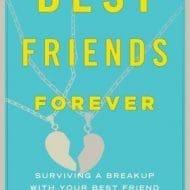Chronic pain is isolating. It can prevent you from doing things with others that you used to enjoy gardening, hiking, dining out and can put a strain on relationships, especially with friends who can’t handle your condition and the changes it has brought.
How can you avoid letting pain interfere with your friendships? When is it appropriate, as well as emotionally healthy, to end a connection that might be distressing you?
We sat down with Irene S. Levine, Ph.D., a professor of psychiatry at New York University’s School of Medicine, to answer these questions and discuss other issues chronic pain sufferers might encounter with their friends.
Called The Dear Abby of Friendship, Levine is an award-winning freelance journalist, creator of the TheFriendshipBlog.com and author of Best Friends Forever: Surviving a Breakup with Your Best Friend.
PR: How much about your pain condition should you share with others?
Levine: The answer varies, of course, depending on the nature and circumstances of the friendship. For example, you would probably want to exercise more caution in telling a co-worker about your condition if you don’t want your employer to know. If the person is a distant acquaintance, you probably wouldn’t want to share anything too personal, whether or not it’s health related. But sharing within the context of a close relationship can be very beneficial in terms of both emotional and logistical support.
PR: Should you share your condition with Facebook friends or keep it more personal?
Levine: Again, it depends what you use Facebook for and who you accept as friends. In most cases, when you post something about your health on a social network you’re compromising privacy you don’t know how far the message will spread, or to whom. If you want to share the blow-by-blow of your condition and its treatment , you may want to opt for a more anonymous venue, such as a pain forum, or via email to a smaller, more trusted circle.
PR: What barometer can you use to know if you can share your condition and emotional trauma with a certain friend? And what if he or she expresses pity instead of concern or compassion?
Levine: Your close friends will want to know about something that is a major concern to you, especially since it may affect your interactions with them. For example, you may need to cancel get-togethers when your pain is overwhelming, or you may not be able to do certain things with them. But you need to exercise judgment when you tell others something so emotionally laden. You also might not want to reveal everything at once. That gives you the opportunity to gauge their sensitivity and concern. If a friend expresses pity, try to remember that it may have more to do with them than with you. They may be worried or fearful, or lack the words to express support in a more positive way. There is no harm in explicitly telling the individual that you didn’t tell them about your pain to garner pity, and that pity makes you feel worse.
PR: What do you do if you lose a friend because of your pain and how it has altered your life? Maybe you can’t run with your running group anymore, so friends from that group no longer call you. Or maybe your best friend in the whole world can’t handle hearing about your pain so stops calling you.
Levine: Find other mutual interests that you can do. You may lose some friends in the process. But make sure that you aren’t doing anything to distance people by ruminating about your pain each time you’re together.
PR: How can you be a friend to yourself when you have chronic pain?
Levine: Easier said than done, but emphasize the things you can do rather than those you can’t. Appreciate the moments you’re pain-free, and seize opportunities for being with people at those times. Many people find it helpful to connect with people in support groups, who are experiencing somewhat similar problems. (Give these support group sites a try and find comfort in community.) link to online support groups story from print mag.
PR: How can you hold on to friendships?
Levine: Consider these things:
- Keep in regular touch.
- If your pain makes it difficult for you to plan, get your gang to buy into spontaneous get-togethers.
- Be open to spending time in small doses, which may be more tolerable for both of you.
- Be candid about your pain, but use discretion in how much you share and with whom.
- Let friends know how they can be helpful and supportive, and find ways to give back to them.
- Remember that everyone has problems; don’t focus entirely on yours.
PR: How can you be a good friend when you’re facing your own battle with pain? Do you give yourself a “friendship pass” so you can focus on your health?
Levine: Isolation can be very depressing for people who enjoy being with others, although some are more content being alone. Listen to your gut and let yourself be involved with friends to the extent you want. You also may need to reassess the nature of your friendships and figure out new ways to relate and stay connected.
PR: How important are friends to your healing? Can friendships make you feel better physical, emotionally, mentally, and spiritually?
Levine: For most people, feeling connected and supported can go a long way in improving their physical and emotional health. A number of studies have even tied social support to longevity and lowered risk of depression.
Let Us Know: How do you handle your friendships when you’re in pain? Share your relationship advice with our community of pain sufferers.


